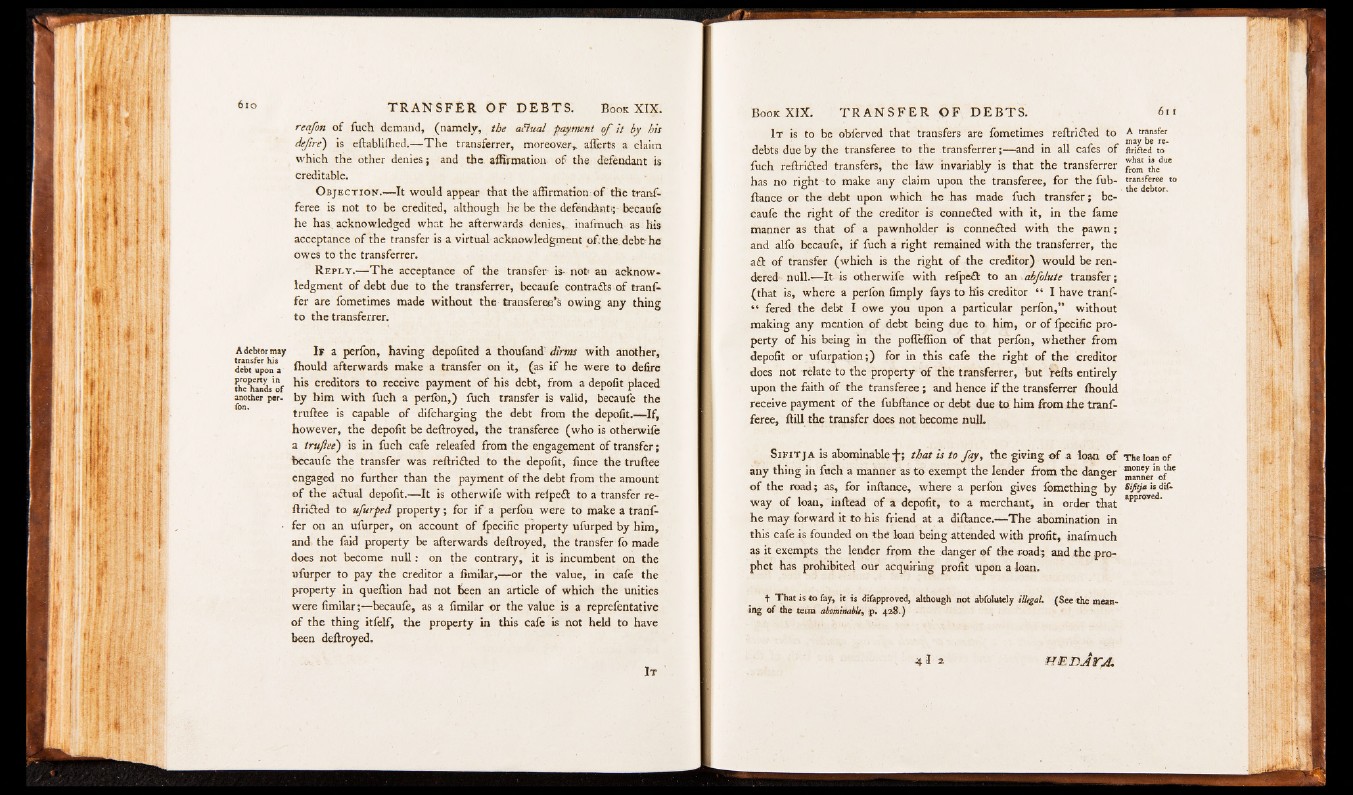
reafon of fuch demand, (namely, the actual payment o f it by his
dejire') is eftablilhed.— The transferrer, moreover,, afferts a claim
which the other denies ; and the affirmation, o f the défendant is
creditable.
Objection.^—It would appear that the affirmation of the tranf-
feree is not to be credited, although he be the defèndànti;- becaufe
he has. acknowledged what he afterwards denies,, inafmuch as his
acceptance of the transfer is a virtual acknowledgment o f the. debit he
owes to the transferrer.
R e p l y .— T h e acceptance of the transfer is- not- an acknowledgment
of debt due to the transferrer, becaufe contracts of tranf-
fer are fometimes made without the transferee’s owing any thing
to the transferrer.
A debtor may I f a perfon, having depofited a thoufand' dirrm with another,
debt upon a fhould afterwards make a transfer on it, (as if he were to delire
the^hands'of ^ls creditors to receive payment of his debt, from a dépolit placed
another per- by him with fuch a perfon,) fuch transfer is valid, becaufe the
truftee is capable o f difeharging the debt from the dépolit.— If,
however, the dépolit be deftroyed, the transferee (who is otherwife
a trujlee') is in fuch cafe releafed from the engagement of transfer;
becaufe the transfer was reftri&ed to the dépolit, lince the trullee
engaged no further than the payment of the debt from the amount
of the aétual dépolit.— It is otherwife with relpeft to a transfer re-
ftri&ed to ufurped property ; for if a perfon were to make a tranf-
• fer on an ufurper, on account of fpecific property ufurped by him,
and the faid property be afterwards deftroyed, the transfer fo made
does not become null : on the contrary, it is incumbent on the
ufurper to pay the creditor a limilar,— or the value, in cafe the
property in queftion had not been an article of which the Unities
were limilar;—becaufe, as a limilar or the value is a reprefentative
of the thing itfelf, the property in this cafe is not held to have
been deftroyed.
I t
I t is to be obferved that transfers are fometimes reftri&ed to
debts due by the transferee to the transferrer;— and in all cafes of
fuch reftridted transfers, the law invariably is that the transferrer
has no right -to make any claim upon the transferee, for the fub-
ftance or the debt upon which he has made fuch transfer; becaufe
the right of the creditor is connedted with it, in the fame
manner as that o f a pawnholder is connedted with the pawn;
and alfo becaufe, i f fuch a right remained with the transferrer, the
adt of transfer (which is the right of the creditor) would be rendered
null.— It is otherwife with refpedt to an abfolute transfer;
(that is, where a perfon limply fays to his creditor “ I have tranf-
“ fered the debt I owe you upon a particular perfon,” without
making any mention of debt being due to him, or of lpecific property
of his being in the pofleffion of that perfon, whether from
depolit or ufurpation;) for in this cafe the right of the creditor
does not relate to the property o f the transferrer, but Veils entirely
upon the faith of the transferee; and hence if the transferrer Ihould
receive payment o f the fubftance or debt due to him from the tranf-
feree, ftill the transfer does not become nulL
Sif it ja is abominable-j-; that is to fey , the giving o f a loan o f
any thing in fuch a manner as to exempt the lender from the danger
o f the road; as, for inftance, where a perfon gives fomething by
way of loan, inftead of a depolit, to a merchant, in order that
he may forward it to his friend at a diftance.— The abomination in
this cafe is founded on the loan being attended with profit, inafmuch
as it exempts the lender from the danger o f the road? and the prophet
has prohibited our acquiring profit upon a loan.
t That is to fay, it is difapproved, although not abfolutcly ille g a l. (See the meaning
of the term a b om in a b le, p. 428.)
4 I 3
A transfer
may be re«
United to
what is due
from the
transferee to
the debtor.
T h e loan o f
money in the
manner o f
Sifitja is disapproved.
W E D A T A .